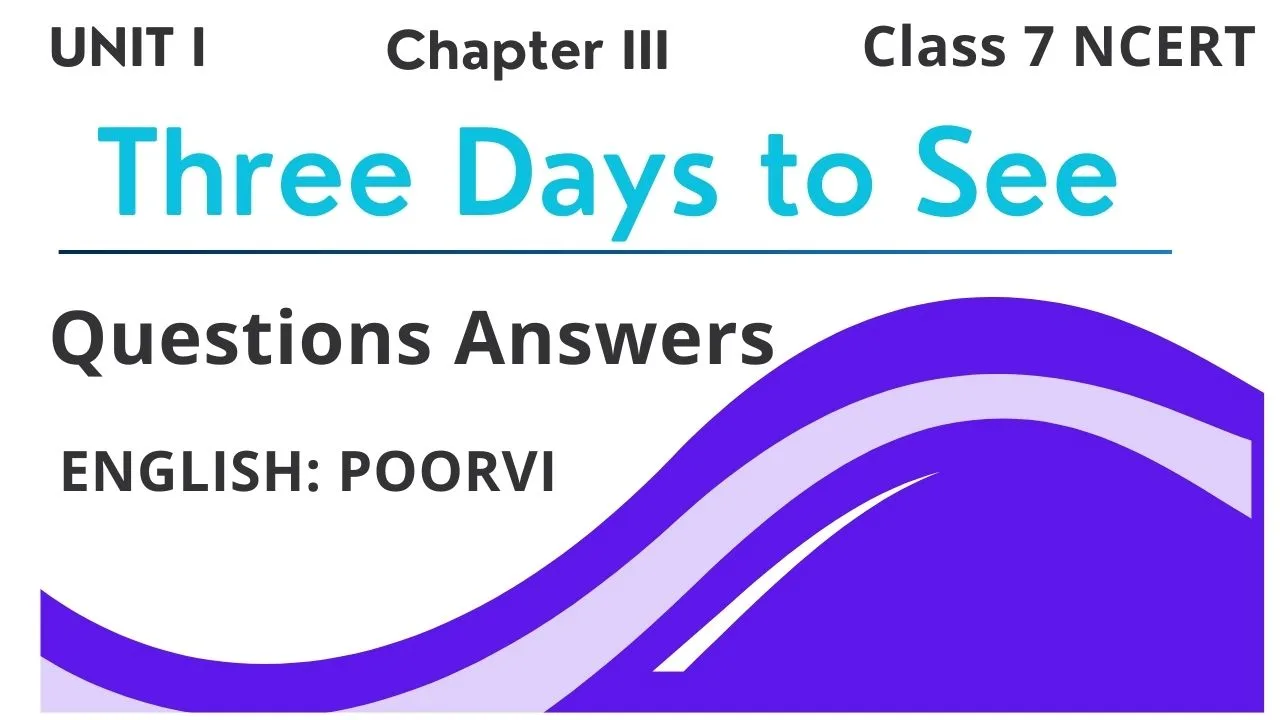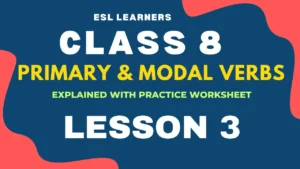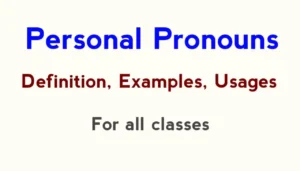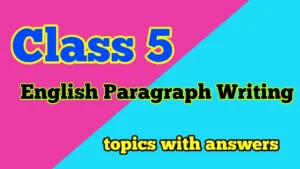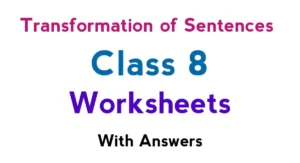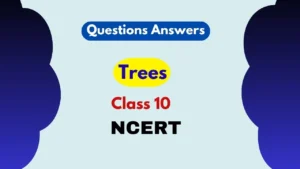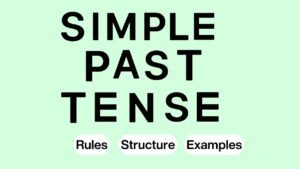Three Days to See Questions Answers Class 7 NCERT English – Get detailed solutions and explanations for UNIT I Chapter 3 from the POORVI English Textbook for Grade 7. This guide includes summaries, question–answer sets, and vocabulary help for clear understanding. Ideal for Class 7 students preparing for exams and assignments.
Let us do these activities before we read. [Page No 28]
I Work in pairs. Recall a visit to a place that you liked. Discuss the details of that place and write about the following:
1. Name of the place
2. The person(s) you went with
3. The things that you could: • see • listen • smell • taste • touch and feel
Ans:
1. Name of the place:
Darjeeling, West Bengal
2. The person(s) you went with:
I went with my parents and younger sister during the summer vacation.
3. The things that I could experience:
- See:
Beautiful green tea gardens, tall pine trees, colourful markets, and the Himalayan mountains in the distance. - Listen:
The whistle of the toy train, chirping of birds, the cool breeze rustling through the leaves, and people chatting happily. - Smell:
The fresh scent of tea leaves, flowers in the garden, and the smell of momos and hot chocolate from roadside stalls. - Taste:
Delicious momos, hot noodles, fresh fruits, and sweet Darjeeling tea. - Touch and Feel:
The chill of the cool mountain air on my face, the soft wool of my sweater, and the smooth wooden railings of the toy train.
POORVI: Textbook of English for Grade 7 Solution
II How does this memory make you feel?
Ans: This memory makes me feel happy and peaceful. I remember feeling relaxed and excited while exploring the place with my family. It was a joyful and refreshing trip that I’ll never forget.
III Do you think your visit/experience would be different if you could not see or hear? Share your answers with your classmates and the teacher. Did you know that our five senses are essential for us to experience and make sense of the world around us?
Ans: Yes, the experience would be very different if I could not see or hear. I would miss the beautiful views and joyful sounds. But I might still enjoy the smell of flowers, the taste of food, and the feel of the breeze. Our five senses help us enjoy and understand the world in many ways.
Summary of the Text by Helen Keller:
Helen Keller, though blind, finds joy in touching things around her. She feels the smoothness of a tree, the rough bark of a pine, and the soft quiver of a singing bird. Even though she cannot see, she imagines the beauty others enjoy through sight. She wonders how much more beautiful the world must be to those who can see. She wishes she could see just for three days.
On the first day, she would like to see the faces of her friends—those whose love and support make her life meaningful. On the second day, she wants to witness sunrise and visit museums to see the history of mankind and nature. On the third day, she would explore the busy life of a city and observe people’s emotions through their faces.
She knows three days would not be enough, and once blindness returns, she would regret not seeing more. Helen ends by advising people who can see to use their senses as if they might lose them the next day. She urges everyone to enjoy the beauty of life through sight, hearing, touch, smell, and taste, and to be grateful for all these senses, especially the gift of sight.
Word Notes from the Text:
Symmetry – balance or proportion (संतुलन / समानुपात)
Delicate – soft, fine (नाज़ुक / कोमल)
Shaggy – rough, bushy (खुरदरा / झबरा)
Bark – outer covering of a tree (पेड़ की छाल)
Bud – new flower or leaf (कली / अंकुर)
Quiver – slight shake or tremble (कंपन / थरथराहट)
Longing – strong desire (आकांक्षा / तीव्र इच्छा)
Mere – only (मात्र / सिर्फ)
Reveal – to show (प्रकट करना)
Companionship – friendship (संग / मित्रता)
Detect – notice or find out (पता लगाना / पहचानना)
Outline – shape or border (रूपरेखा / आकृति)
Emotion – feeling (भाव / भावना)
Dawn – sunrise or early morning (भोर / सूर्योदय)
Thrilling – exciting (रोमांचक / उत्साहपूर्ण)
Transformed – changed completely (बदला हुआ / रूपांतरित)
Behold – to see (देखना / निहारना)
Panorama – wide view (विस्तृत दृश्य)
Awakens – wakes up (जगाता है)
Glimpse – brief look (झलक / संक्षिप्त दर्शन)
Pageant – grand show or display (शानदार प्रदर्शन)
Condensed – made short or concentrated (संक्षिप्त / सघन)
Carcass – dead body of an animal (जानवर का मृत शरीर)
Mastodon – extinct large animal like an elephant (हाथी जैसा विलुप्त विशाल जानवर)
Stature – height or status (कद / प्रतिष्ठा)
Conquer – to defeat or win over (विजय पाना)
Haunts – familiar places (परिचित स्थान)
Determination – strong will (दृढ़ संकल्प)
Compassionate – kind and sympathetic (दयालु / सहानुभूतिपूर्ण)
Descend – fall or go down (नीचे उतरना / अवतरण करना)
Stricken – affected (negatively) (पीड़ित / प्रभावित)
Tactile – related to touch (स्पर्श संबंधी)
Relish – enjoy deeply (आनंद लेना / स्वाद लेना)
Morsel – small piece of food (छोटा टुकड़ा / ग्रास)
Facets – aspects or sides (पहलू / पक्ष)
Delightful – full of joy (आनंददायक)
Glory – great beauty or pride (गौरव / महिमा)
Let us discuss [Page No 31]
I Work in pairs. Identify the statements that are true from the ones given below. Share your answers with the teacher.
Ans:
Identify the True Statements (from the text):
- False – The author expresses a longing to experience the world through sight, not hearing.
- False – She wants to observe people in the city to understand their lives, not just to see suffering.
- True – On the first day, she would like to see the people whose kindness and companionship made her life worth living.
- True – The author acknowledges that in three days, she could not see everything she wanted to.
- False – She enjoys touch but feels sight would reveal even more beauty.
- True – The author advises people to use their senses as if they might lose them tomorrow.
- True – On the third day, she wants to observe people in their daily lives and understand them through sight.
II Complete the table given below with what Helen Keller wanted to do on the three days if she had sight.
Ans:
| Day 1 | Day 2 | Day 3 |
| See the people, know her friends from the feel of their faces, observe emotions like laughter and sorrow | Arise with the dawn, see the transformation of night into day, visit museums, see the history of the earth and man’s progress | Spend time in the workaday world, go to the city, observe people, understand their daily lives |
III The author says that you need eyes to be able to ‘see’ the true self of a person. Therefore, she refers to the eye as ‘window of the soul’. How is the narrator able to understand the feelings of a person?
Ans: The narrator understands feelings without seeing. She uses her fingertips to feel the outline of a person’s face. Through touch, she can sense expressions and emotions. She detects laughter, sorrow, and other clear feelings this way. Touch helps her connect with others even without sight.
Let us think and reflect [Page No 32]
I Read the extracts given below and answer the questions that follow.
1. I feel the delicate symmetry of a leaf. I pass my hands lovingly about the smooth skin of a silver birch, or the rough, shaggy bark of a pine. In spring, I touch the branches of trees hopefully in search of a bud, the first sign of awakening Nature after her winter’s sleep. Occasionally, I am very fortunate; I place my hand gently on a small tree and feel the happy quiver of a bird in full song.
i) What does the ‘delicate symmetry of a leaf’ symbolise?
Ans: It symbolises the fine and balanced beauty of nature that can be felt through touch.
(ii) List two phrases from the extract that describe the texture of objects in nature.
Ans:
a. “smooth skin of a silver birch”
b. “rough, shaggy bark of a pine”
(iii) Complete the sentence appropriately:
Ans: The phrase ‘awakening Nature after her winter’s sleep’ refers to the arrival of spring when new buds begin to grow.
(iv) What is the tone of the writer in this extract?
Ans: C. admiring
2. The next day I should arise with the dawn and see the thrilling miracle by which night is transformed into day. I should behold with awe the magnificent panorama of light with which the sun awakens the sleeping earth. This day I should devote to a hasty glimpse of the world, past and present. I should want to see the pageant of man’s progress, and so I should go to the museums.
(i) The word ‘thrilling’ has been used with ‘miracle’. Which of the following words does not match with the word ‘thrilling’?
Ans: C. knowledge
(ii) Why does the writer refer to the earth as ‘sleeping earth’?
Ans: Because the earth is still and quiet at night and seems to wake up with the light of the sun.
(iii) Complete the sentence with an appropriate reason:
Ans: The writer wishes to dedicate the day to a brief look at the present and past world because she wants to see the pageant of man’s progress in museums.
(iv) Why does the writer use ‘should’ multiple times in the extract?
Ans: She uses “should” to express her imagined actions and wishes if she were given the chance to see.
II Answer the following questions.
1. The sense of touch makes up for the loss of sight and hearing.
Ans: The author says she enjoys many things through touch. She feels the smooth bark of a tree, the quiver of a bird, and the faces of her friends. She can detect laughter and sorrow with her fingertips. Touch helps her understand people and nature even though she cannot see or hear.
2. Why does the author believe that the sense of sight is the most wonderful?
Ans: The author says she gets great pleasure from touching things. So, she feels sight must reveal even more beauty. Sight can show people’s emotions, the beauty of nature, and the history of the world. That is why she thinks sight is the most delightful of all the senses.
3. How might the author’s opinion on making the most of our senses guide us to be kinder towards people with special abilities?
Ans: The author says people should use their senses as if they might lose them tomorrow. This helps us realise their true value. It makes us more thoughtful and caring towards people who cannot see, hear, or touch like others. It teaches us to be grateful and kind.
4. What is the significance of imagining the loss of a sense, according to the author?
Ans: The author says if people imagine losing a sense tomorrow, they will enjoy it more today. It helps them listen, see, smell, touch, and taste more deeply. This thought helps people live fully and value every moment. It also makes them aware of the beauty around them.
5. How does the author encourage people to approach their everyday sensory experiences?
Ans: The author says we should use every sense—sight, hearing, touch, smell, and taste—as if tomorrow they would be lost. She asks us to hear music, feel things, smell flowers, and enjoy food deeply. This helps us enjoy life more and feel the joy in small things.
6. What do the author’s choices for the three days tell us about her values and priorities?
Ans: On Day 1, she wants to see her kind friends. On Day 2, she wants to see nature and human history. On Day 3, she wants to observe people in daily life. This shows she values love, knowledge, nature, and understanding people. Her priorities are feeling, learning, and connecting.
Let us learn [Page No 34]
I Sensory words are descriptive—they describe how we experience the world: how we see, hear, smell, taste or feel something. Complete the following table with sensory words from the text in Column 2 for the five senses in Column 1. Add new words in Column 3.
Ans:
Sensory Words Table
| Column 1 (Sense) | Column 2 (From the Text) | Column 3 (New Word) |
| What you see | panorama | glimpse |
| What you hear | music | song |
| What you smell | perfume | flowers |
| What you taste | relish | morsel |
| What you feel | rough | smooth / shaggy / quiver |
II Read the following sentences from the text and underline the verbs.
Ans:
- I should divide the period into three parts.
- On the first day, I should want to see…
- The next day I should arise with the dawn…
- I should behold with awe…
- Modal Verb: should
- Main Verbs: divide, want, arise, behold
III Identify the modal verbs in the following sentences. Choose the functions they express from those given in the box below.
| possibility necessity polite request ability moral obligation |
Ans:
Identify Modal Verbs and Their Functions
| Sentence | Modal Verb | Function |
| 1. You can learn a lot from this experience. | can | ability |
| 2. They might arrive late due to traffic. | might | possibility |
| 3. She must finish her homework before dinner. | must | necessity |
| 4. They ought to apologise for their mistake. | ought to | moral obligation |
| 5. He would like to have some lassi, please. | would | polite request |
IV Read the situations in Column 1 and functions in Column 2. Fill in the blanks in the sentences in Column 4 with appropriate modal verbs from Column 3. After filling in the blanks, explain the function of each modal verb you used to your classmates and the teacher
Ans:
Fill in the Blanks with Modal Verbs and State Their Function
| Situation | Function | Sentence (with Modal) |
| 1. Want to leave work early | permission | (i) May I leave early today if I finish all my tasks? |
| 2. Important deadline tomorrow | obligation | (ii) I must finish this report by tomorrow. |
| 3. Friend thinking of joining Art class | advice | (iii) You should consider all the pros and cons before making a decision. |
| 4. Dark clouds in the sky | possibility | (iv) It might rain later today. |
| 5. Asking for salt | polite request | (v) Could you pass the salt, please? |
| 6. Advising someone to apologise | moral obligation | (vi) You ought to apologise for the mistake you made. |
| 7. Suggesting picnic place | suggestion | (vii) We could go to any park nearby for picnic. |
Let us listen [Page No 36]
You will listen to a conversation between a mother and son. As you listen, select four true statements from 1–7 given below. (Transcript for the teacher on pg. 41)
Ans:
True Statements:
- Anuj initially thinks that Digital India is only about learning how to use computers.
True – He says, “Oh, Digital India! That’s about being computer literate, isn’t it?” - Mother believes that screen readers are very effective for persons who are visually impaired.
True – She explains how screen readers help and says they improve quality of life. - Anuj wants to know about the effectiveness of assistive technologies for persons who are visually impaired.
True – He asks, “What is a screen reader, Ma?” - Mother believes a right mindset is the best support for persons who are visually impaired.
True – She ends the conversation saying, “Inclusion is not just about having the right tools, but also about having the right mindset.”
False Statements (not to be selected):
- Anuj finds the concept of Braille fascinating and wants to learn more about it.
Not stated. He only says Tara uses Braille but doesn’t ask to learn more. - Mother is unsure of the school’s efforts to include students with visual impairment.
False – She praises the school and says it’s great. - Anuj already knew that persons who are visually impaired can use computers and smartphones.
False – He is surprised and says, “That’s amazing!”
Let us speak [Page No 36]
Work in pairs. Take turns to speak for a minute on any one of the senses you value the most. Use the given prompts to frame your response before you speak.
Ans:
Speech: “The Sense I Value the Most”
Good morning everyone,
Today, I would like to speak about the sense I value the most — and that is my sense of sight. I value my sight because it helps me enjoy the beauty of the world around me. From colourful flowers to smiling faces, everything becomes meaningful when we can see it. One of my favourite experiences is watching a sunset with my family from our rooftop. The sky slowly changes colours — orange, pink, and purple — and the peaceful moment brings us all together. This means so much to me because sight allows me to enjoy nature, read books, look at pictures, and learn in so many different ways. I truly appreciate being able to see my loved ones, my school, and all the things that make life beautiful. God forbid, if I were to lose the sense of sight, I would feel very sad and helpless at first. I wouldn’t be able to read or enjoy the little things like watching the rain or seeing my friends’ smiles. That’s why I thank God every day that I can see, and I remind myself not to take this gift for granted.
Thank you.
Let us write [Page No 37]
A descriptive paragraph describes a person, place, object, or event to create a memorable experience for the reader. Write a descriptive paragraph describing a place that you visited recently.
Ans:
A Memorable Visit to Varanasi
Last month, I visited Varanasi, one of the oldest and most spiritual cities in India. The moment I stepped onto the ghats of the Ganga, I was greeted by the scent of incense, the sound of temple bells, and chants filling the air. The river shimmered like melted gold under the morning sun, and the ancient temples stood proudly, echoing tales of devotion and time. I walked barefoot on the warm stone steps, feeling connected to centuries of faith. The taste of hot jalebis and spicy kachoris from a street vendor added flavour to the experience. As the evening Ganga Aarti began, the sight of hundreds of lamps floating on the river was truly magical—as if the stars had come down to bless the water.
The spiritual energy, vibrant culture, and timeless beauty of Varanasi make it a place everyone should experience at least once in their life.
Let us explore [Page No 37]
I Do you know how persons with visual challenges are able to read and write? They read through touch with the help of Braille, code of raised dots that represents the letters of the alphabet. This tactile code was developed over a period of nine years by Louis Braille, who became blind at a very young age due to an accident.
Ans:
For Example: Name “ANUSKA NANDI”
A N U S K A
| 1. A | 2. N | 3. U | 4. S | 5. K | 6. A |
| ● ○ ○ ○ ○ ○ | ● ○ ● ● ○ ○ | ● ○ ○ ○ ● ● | ● ● ○ ● ○ ○ | ● ○ ● ○ ○ ● | ● ○ ○ ○ ○ ○ |
N A N D I
| 1. N | 2. A | 3. N | 4. D | 5. I |
| ● ○ ● ● ○ ○ | ● ○ ○ ○ ○ ○ | ● ○ ● ● ○ ○ | ● ● ○ ○ ○ ● | ○ ● ● ○ ○ ○ |
Instructions to Make It Touchable:
- On a thick paper or cardboard, draw six-dot cells for each letter.
- Use bindis or daal grains where there are filled dots (●).
- Leave the blank dots (○) empty.
- Keep some space between letters so each Braille cell is clear.
II Have you heard about the International Day of Persons with Disabilities? Find out when and how it is observed in India. Write your findings on a sheet and put it up on the class board.
Ans:
International Day of Persons with Disabilities
Observed on: 3rd December every year
The International Day of Persons with Disabilities is observed every year on 3rd December to raise awareness and show support for people with disabilities. The aim is to promote understanding, equal rights, and opportunities for everyone, regardless of physical or mental challenges.
How it is observed in India:
In India, this day is marked by:
- Organizing cultural events, inclusive sports, and awareness programmes in schools, colleges, and government offices.
- Honouring achievements of people with disabilities and spreading awareness about their rights and needs.
- Promoting accessibility in public spaces and encouraging everyone to treat persons with disabilities with respect and dignity.
- Many cities hold rallies, exhibitions, and seminars to celebrate the day.
This day reminds us that everyone deserves equal chances and that society becomes stronger when it includes and supports all its members.
Summary for Class Board
- Title: International Day of Persons with Disabilities – 3 December
- Purpose: To honour the resilience and rights of persons with disabilities
In India: Greeted with awareness campaigns led by government departments, official launch of accessibility initiatives (e.g., Sugamya Bharat Abhiyan), inclusive fairs, and showcasing policies and rights frameworks

